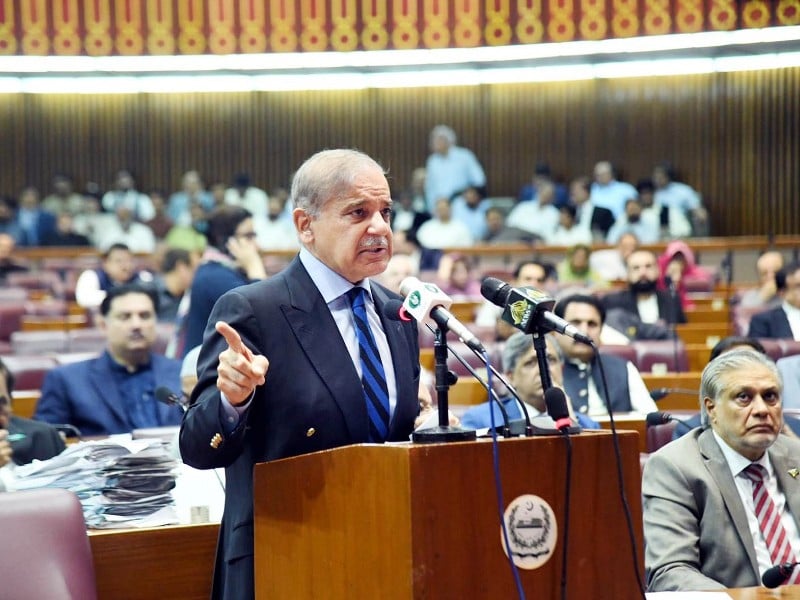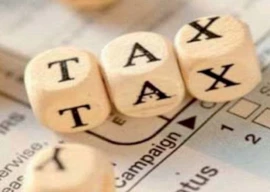
The forecast may be cloudy for Sunday, but PML-N President Shehbaz Sharif is poised for a political sunrise, expected to assume the mantle of the country's next prime minister, just 24 days after the ‘controversial’ general elections.
At a time when the country is close to seeing the formation of a new federal government, rigging allegations have cast a shadow over the country’s political landscape, leading to intensified tensions between former allies, the PML-N and the JUI-F.
Attempts at finding common ground between the two have proven challenging, even with PML-N leader Nawaz Sharif's charm offensive failing to sway JUI-F chief Maulana Fazlur Rehman to support his brother, Shehbaz Sharif. Instead, Maulana Fazlur Rehman has opted to skip the election altogether, embarking on a three-day visit to Karachi.
Meanwhile, the PTI was protesting against the alleged rigging in the polls. Its candidate for the prime minister’s slot, Omar Ayub Khan, submitted his nomination papers to the NA secretariat from the platform of the Sunni Ittehad Council (SIC) for the post.
In addition, he submitted an objection over Shehbaz’s nomination papers to NA Speaker Ayaz Sadiq, claiming that the PML-N leader had lost the election in his constituency -- NA-123 (Lahore-VII) but was declared victorious after manipulation in Form-47.
He added that therefore, Shehbaz was ‘ineligible’ for the post of the premier. The NA speaker has approved the papers of both the candidates for the PM’s slot.
Knowing that the alliance of the PML-N, the PPP, the MQM-P and other parties has a clear numerical strength in the NA, the PTI while learning lessons from the past --especially after seeing the stunning results of the recent general elections despite being cornered -- has decided not to leave the battlefield empty and give a walkover to the other side.
While lending legitimacy to the emerging government, this development simultaneously completes a full circle in the broader political context. After the 2018 general elections, Shehbaz said that his party was participating in parliamentary politics as a form of protest. In 2024, the PTI finds itself in the National Assembly, aligning with the SIC, citing similar reasons.
As far as the numbers are concerned, the newly-stitched ruling alliance has a clear majority to form the government in the Centre.
Currently, the votes of 169 out of the total 336 members of the NA are required to elect the premier and form the government.
It became evident during the elections for the speaker and his deputy a day earlier that the PMLN-led alliance had 199 votes -- 30 more than required -- to clinch the office of the prime minister. The PTI-SIC candidates received 90-plus votes.
The election for the post of the premier is scheduled to be held on Sunday (today) at 11am. The premier is elected by MNAs in accordance with the Second Schedule of the Rules of Procedure and Conduct of Business in the National Assembly, 2007.
As per the NA rules, before the voting commences, the speaker shall direct that the bells be rung for five minutes to enable the members not present in the chamber to reach there.
Immediately after the bells stop ringing, all the entrances in the lobby will be locked. The assembly staff posted at each entrance will not allow entry or exit through them until the voting has concluded.
Then the speaker will read out to the House the names of the validly nominated candidates, who have not withdrawn in the order in which their nomination papers were received and proceed to hold the poll in accordance with the procedure set out in the Second Schedule.
After that, the speaker will ask the members to pass in a single file through the entrance where the tellers will be posted to record their votes.
On reaching the desk of the tellers, each member will, in turn, call out the division number allotted to them under the rules.
The tellers will then mark off their number on the division list, simultaneously calling out the name of the member.
In order to ensure that their vote has been properly recorded, the member will not move off until they have clearly heard the teller call out their name.
After a member has recorded their vote, they will not return to the chamber until the bells are rung.
At the end, when the speaker finds that all the members, who wished to participate in the polling process, have recorded their votes, he will announce that the voting has concluded.
Later, the NA secretary will ensure the collection of the division list, count the recorded votes, and present the result to the speaker. The speaker will then order that the bells be rung for two minutes to enable the members to return to the chamber. After the bells stop ringing, the speaker will announce the result to the House.
Once the votes are tallied, if there is only one contesting candidate and they secure the votes of the majority of the total membership of the assembly, the speaker shall declare them to have been elected as the leader of the house or the prime minister.
However, if there is only one contesting candidate and they fail to secure the votes of the majority of the total membership of the assembly, all proceedings will commence afresh. If there are two or more contesting candidates and none of them secures a majority in the first election, a second poll will be held between those who bagged the two highest numbers of votes in the first one.
The candidate, who secures a majority of votes of the members present and voting, will be declared to have been elected as the prime minister.
However, if the number of votes secured by two or more candidates bagging the most is equal, another election will be held between them until one of them secures a majority.
Seeing the number game in the NA, Shehbaz is set to become the premier again. He served as the premier after the then-prime minister Imran Khan was ousted through a vote of no-confidence in April 2022.

1731619853-0/ice-cream-(1)1731619853-0-405x300.webp)







1726732405-0/Express-Tribune-Web-(15)1726732405-0-270x192.webp)




1708843092-0/E1BE23D5-3747-4E5E-A748-5791AAA6B942-(2)1708843092-0-270x192.webp)






COMMENTS
Comments are moderated and generally will be posted if they are on-topic and not abusive.
For more information, please see our Comments FAQ